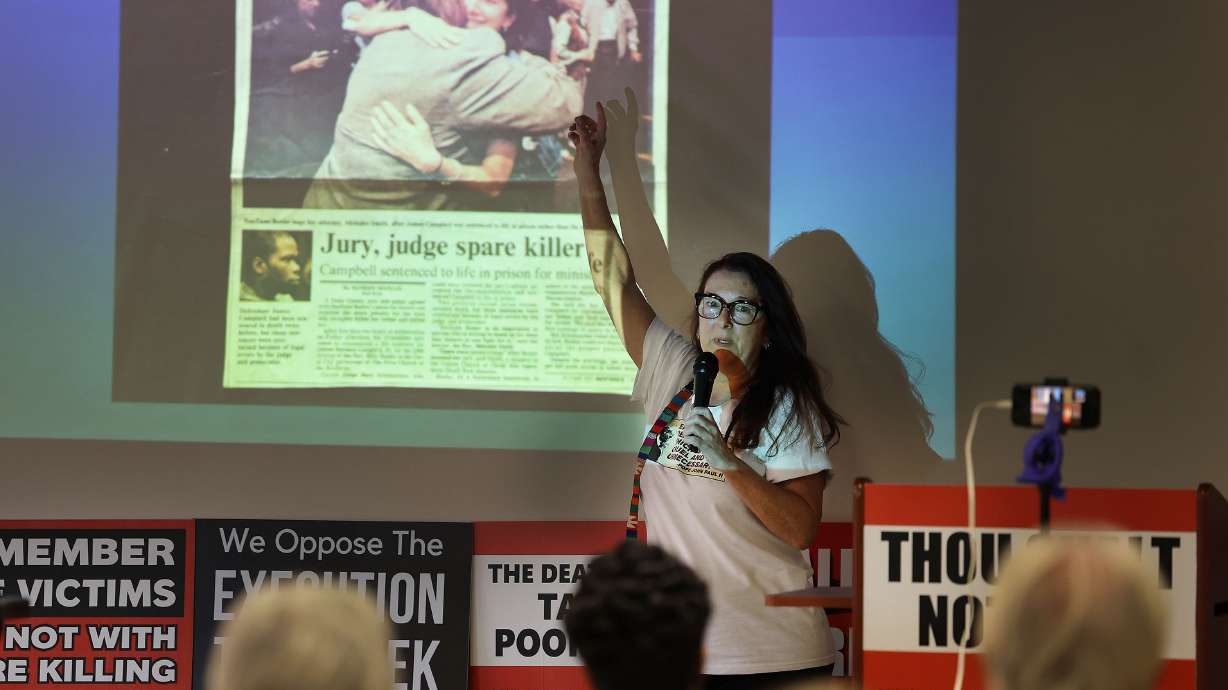Estimated read time: 4-5 minutes
This archived news story is available only for your personal, non-commercial use. Information in the story may be outdated or superseded by additional information. Reading or replaying the story in its archived form does not constitute a republication of the story.
SANDY — Abraham Bonowitz has a question for society as Utah prepares this week to execute its first death row inmate in 14 years.
"The question that we ask is — do we deserve the power to kill?"
Bonowitz is the executive director of Death Penalty Action, a group that works to stop executions and abolish the death penalty. He is in Utah to protest the execution of Taberon Honie, scheduled for just after midnight Thursday at the Utah State Prison.
"What you have to do is hope for the best and pray for the best, but prepare for the worst," he said. "And the situation that we're in right now is the worst."
His group has worked to bring those impacted by violent crimes and the death penalty together, to advocate for legislative change. "There is a gut reaction, that people who commit awful crimes deserve whatever they get coming," he said to a group gathered Sunday in the Blessed Sacrament Church Parish Center in Sandy to engage in discussions around the ethical implications of Honie's execution.
"Can we be trusted with the power to kill? Can we always get it right? Do we live up to the bedrock foundation of our legal system?" Bonowitz asked.
Equal justice under law, contends Bonowitz, does not happen with death penalty cases. In the sentencing process, he says "money, race, politics and geography all matter more than the severity of the crime."
According to Bonowitz, capital punishment hinges on the amount of money a person has to hire a legal team, the race of the defendant and victim, the timing of whether officials are up for reelection, and if the county where a crime is committed can afford to prosecute a death penalty case.
"In my brother's case, we got left behind," said Charles Keith, whose brother was on death row until his sentence was commuted in 2010. "We did not have the money. We didn't have the knowledge. We didn't have anything — we were victims. As we sit and watch my brother become a victim. We also became victims, because we knew that he was innocent."

Randy Gardner, whose brother Ronnie Lee Gardner was the last person executed in Utah in 2010, also joined Sunday's meeting. He called the death penalty "premeditated murder" and believes life without parole is a good alternative to a death sentence.
"These people on death row, they know the time and the place that they're going to be executed. Who knows that in this world?" Gardner said. "It's hard in Utah. In Utah they're are pro-life until it comes to the death penalty. ... For me it's kind of a hypocritical thing."
One audience member pointed out the Utah Board of Pardons and Parole can parole a person sentenced to life in prison without parole "if the board finds by clear and convincing evidence that the person is permanently incapable of being a threat to the safety of society," according to state code. He said a life sentence can't be relied on as an alternative to the death penalty if such a sentence could potentially be shortened after the fact.
Bonowitz argued it is immoral for state officials to be asked to take on the burden of killing a person who can no longer hurt anyone.
Another speaker, SueZann Bosler, watched a man stab her father, Rev. Billy Bosler, to death before being stabbed herself and left for dead in 1986. Bosler shared the process of healing from those emotional and physical wounds, and her fight to appeal the killer's death sentence.
"If I help the government, my title would be murderer too. And I refuse. I refuse to be a part of that," Bosler said.
"No amount of killing is going to bring back our loved ones," Bonowitz said. "There's always going to be a that empty chair at the table when the family gathers. So what if we became able to move forward, instead of being stuck waiting for that so-called justice?"

In Bonowitz's experience interacting with the families of victims of violent crimes, he said "the truth is that when there's not a death sentence, it's actually a blessing in disguise for such people because they can begin a healing process."
The audience was divided on some issues Sunday, with one man pointing out the other avenues in which law enforcement and the military are able to take the lives of American citizens, and the fine line that divides those actions. Another commenter, who herself was a friend of a murder victim, was not sure she would disagree with a death sentence for some violent offenders.
Michelle Beasley, who helped organize the event, said her faith plays a large role in her stance on the death penalty.
"I, as a Catholic person, believe it should not be on someone else's schedule when you are able to reconcile with God. Please let him do it in his own time, and if it's life in prison, you give him that opportunity to do it in his own time. We are not the murderer."
The group will be holding a press conference at the state Capitol on Wednesday, and presenting letters of concern and petition signatures to Utah Gov. Spencer Cox, before protesting the execution scheduled for early Thursday.
Correction: The story initially stated it has been 24 years since Utah's last execution. It was 14 years ago, in 2010.










